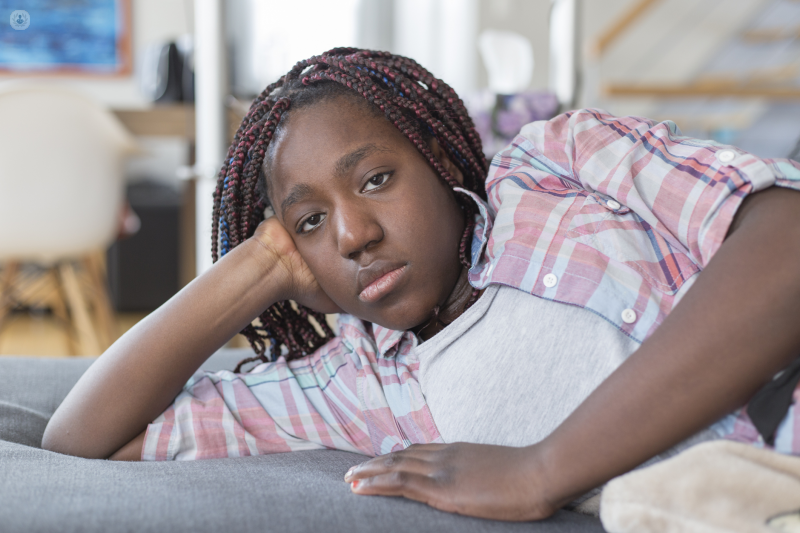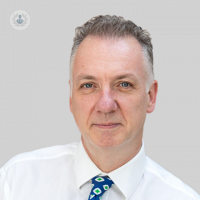Worried that your teenager has a thyroid problem? - a guide to thyroid disorders in adolescents
Written by:The thyroid is a gland located in the neck, which creates hormones that keep your body working normally, such as controlling metabolism, the structure of bones, growth and sexual development – a big job for a gland weighing less than 28g! Thyroid disorders are common, and these cause an imbalance in the hormones produced, which can have a great effect your body. While most common in women, anyone can suffer from thyroid conditions, and the challenge with adolescents is identifying the symptoms, which can manifest in behaviours common to teenagers. Dr Mark Vanderpump, a top endocrinologist specialising in metabolism and gland disorders explains:

hypo vs HYPER
First, let’s clear up any confusion. Hypothyroidism and hyperthyroidism may sound similar, but by changing a few letters we are describing totally opposite conditions.
- Hypothyroidism, or an underactive thyroid, is when the thyroid gland is not producing enough of the hormones the body needs to function at a normal rate. 85% of thyroid disease cases in adolescents fall under this category.
- Hyperthyroidism, or an overactive thyroid causes an over-production of hormones. 15% of thyroid disorders in adolescents are of a hyperthyroid nature.
HYPOTHYROIDISM
In teenagers, the most common cause of hypothyroidism is Hashimoto’s autoimmune thyroiditis, affecting approximately 1-2% of teenagers (mainly girls). Hashimoto’s runs in the family in about half the cases.
Patients with certain other conditions, such as Down’s syndrome and Turner’s syndrome, or autoimmune disorders like coeliac disease, alopecia, vitiligo and type 1 diabetes have a higher risk of autoimmune hypothyroidism.
Symptoms of hypothyroidism
Adolescents with hypothyroidism may experience symptoms such as constipation, dryer hair and/or skin than normal, feeling cold and tired, and difficulty concentrating. The problem is that your teenager may not tell you about these things, believing them to be a normal part of growing up.
Other, more noticeable hypothyroidism symptoms could include poor growth, delayed puberty and, in girls, irregular periods.
A common misconception is that hypothyroidism causes weight gain, but this is not usually the case – more commonly weight gain can cause minor changes in the levels of hormones produced by the thyroid.
Treatment for hypothyroidism
Levothyroxine (L-T4) is a synthetic version of thyroxine – one of the hormones produced by the thyroid. Supplements of levothyroxine are the standard hypothyroidism treatment, although with teenagers it may be a challenge to keep them taking medication regularly, so it is a good idea to establish a routine or system to keep them on track.
HYPERTHYROIDISM
The most common form of this is Graves’ disease (autoimmune hyperthyroidism), which is more common in girls than boys, with most cases  occurring between the ages of 10 and 15.
occurring between the ages of 10 and 15.
Like hypothyroidism, hyperthyroidism often goes hand in hand with other autoimmune diseases (many of them hereditary), such as type 1 diabetes, Addison’s disease, pernicious anaemia, coeliac disease and systemic lupus erythematosus (SLE), and syndromes such as Down’s and Turner’s.
Symptoms of hyperthyroidism
Hyperthyroidism can cause several symptoms that are frequently associated with teenagers, such as moodiness, restlessness, difficulty concentrating, trouble sleeping and hyperactivity. It can also cause more frequent bowel movements, which adolescents may be reluctant to mention. As a result, these hyperthyroidism symptoms often go unnoticed.
However, if the teenager is displaying symptoms such as hand tremors, itchy or red skin, or bulging eyes, they should see their GP or a specialist.
Treatment for hyperthyroidism
Anti-thyroid drugs, radioiodine and thyroidectomy (removal of part or all of the thyroid) can be used to treat Graves’ disease in children and adults alike.
Most children will need anti-thyroid drug treatment for a long time compared with adults, and the remission rate is lower. Relapse is also common.
Radioiodine therapy is very effective, but most paediatric endocrinologists won’t use this treatment on children younger than ten, due to a theoretical risk of the thyroid gland becoming more sensitive to radioiodine when administered. However, it is quickly becoming the first treatment option for teenagers with hyperthyroidism.
A thyroidectomy is usually only performed on children whose thyroid has become notably enlarged. Currently, most thyroidectomies remove almost the entire thyroid, and as a result, hypothyroidism is more or a less a certainty (however, it is much more manageable).


